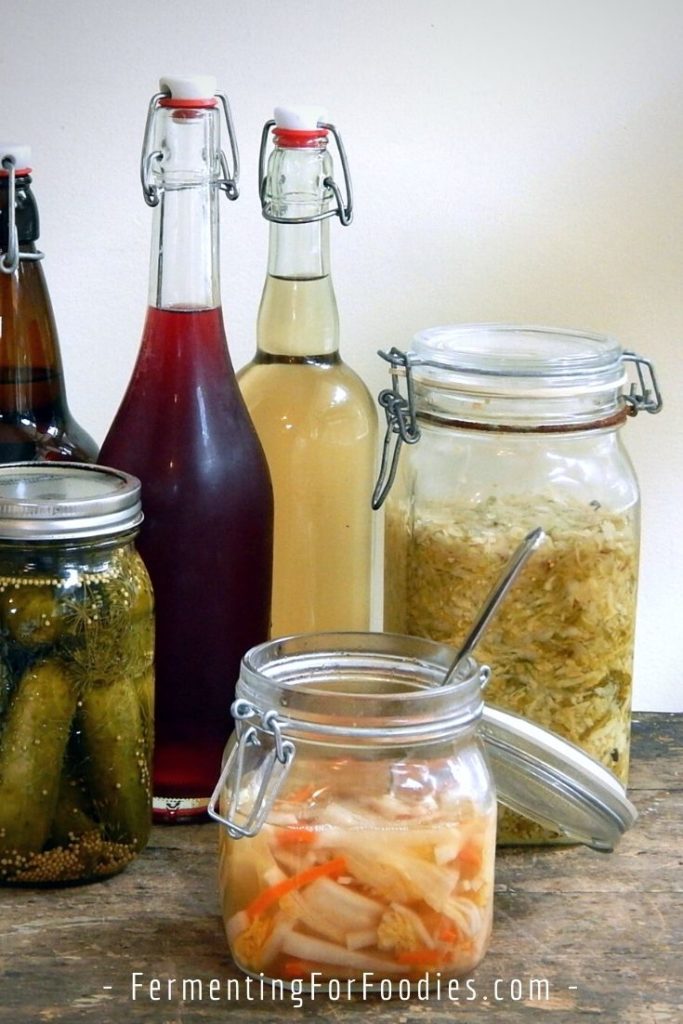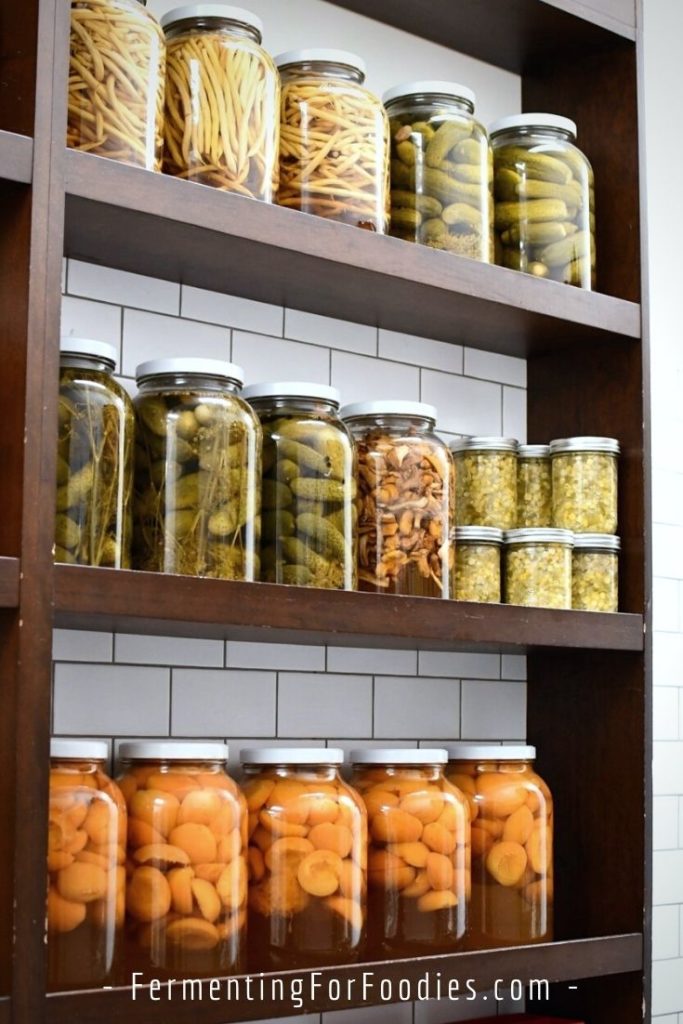Are you wondering how long will fermented vegetables last in the basement? Or how long can you keep kombucha in the fridge? Here is everything you need to know about the shelf life of fermented foods.

How Fermentation Preserves Food
The goal of food preservation is to prevent unwanted bacteria, yeasts and molds from spoiling food. Preservation also maintains the flavor and texture of food.
Fermentation preserves food through a number of mechanisms.
- Culturing food with particular strains of bacteria, yeast or mold inhibits the growth of undesirable bacteria, yeasts, and mold. A good culture will outcompete the bad culture and prevent spoiling. Yogurt is a good example of this. A jug of milk lasts, on average, about 7 days after it has been opened. If that milk is cultured into yogurt it should last at least 14 days.
- Vegetables become more acidic as they ferment, which limits the growth of unwanted bacteria. In a sense, fermented vegetables are naturally pickled by lactic bacteria.
- Beverages fermented with a yeast-based culture (beer, wine, kombucha, and kefir) will become alcoholic over time, which also prevents the growth of bacteria and yeasts.
The Shelf Life of Fermented Foods
The shelf life of fermented food is somewhat subjective. Fermented food will continue to ferment, even after it has been refrigerated. Deciding if it still tastes good will depend on your tastebuds.
Regardless, here are some rough guidelines:
Vegetables
Fermented vegetables will become softer and more acidic as they age. So the shelf life of fermented vegetables depends on personal taste.
- Sauerkraut and cucumber pickles are traditionally long-fermented vegetables. They can last for up to a year in a dark, cool location.
- Other brine-fermented vegetables can be stored in a cool dark location for 6 months to a year. However, they will become really soft as they ferment. Since I like my fermented carrots, green beans, and turnips to still be somewhat firm, I store them in the fridge for up to a month after the initial fermentation.
- Chutney, salsa, and relish will all soften and sour as they age. I recommend storing them in the fridge for up to 3 months or in the freezer for 6 months.
- Hot sauce can last for 6 months in a cool dark location.
- Kimchi is typically eaten fresh, so after 3-5 days of fermentation. However, it is a sauerkraut-like ferment, so it can easily last up to a year in a cool dark location.
If you are planning on storing fermented vegetables for more than just a few weeks, be sure to use a fermentation-specific container. These will prevent contamination while allowing gas to escape. Good options include fido jars and pickle pipes.
Kombucha, water kefir, kvass, ginger bug and jun
Fermented soda pop will continue to ferment, even if it is stored in the fridge. They will become sourer as they age, so enjoy them while they taste good! Or store them in the fridge for up to 6 months.
Homemade Alcoholic Beverages
Beer and cider are low alcohol, and unless you use preservatives, they will continue to ferment until most of the sugars are consumed.
- Homebrewed Beer will taste best if drunk within 4 months of bottling.
- Cider should be stored in the fridge after bottling to slow down the carbonation. It tastes best the first 4 weeks after bottling.
- Wine has a higher alcohol content and actually tastes better as it ages. Store homemade wine in a cool dark location. And don’t start drinking it until after it has aged for at least a year. It should last in storage for around 5 years.
Miso
Good miso is aged for at least a year. Once you’ve opened it and started using it, then store it in the fridge. Miso will last for years, but it tastes best in the first year. After that, it starts to lose its flavor.

How to Tell if Fermented Food has Spoiled
It is usually fairly obvious when fermented food has gone off. However, no one really wants to admit that something they’ve been waiting for months to eat has gone bad.
Here’s how to tell if a ferment has gone off:
- Visual inspection: Start by looking at the ferment. Older ferments may have a slightly duller color. However, if you see mold, then it has gone off and you will need to throw it out. Ferments contaminated with yeast may still be okay to eat. For more information read this post on the difference between kahm yeast and mold.
- Smell: Fermented food should smell good. Even after fermenting for a few months, kombucha should smell like really strong kombucha. Sauerkraut should smell like sauerkraut. If the food smells rotten, moldy, or bad, then throw it out.
- Taste: If the ferment doesn’t taste like you expect it to, or if it doesn’t taste good, then it’s probably gone off. Either it fermented for too long, or it has been contaminated by unwanted bacteria. Either way, you shouldn’t eat it.


How long will fermented vinegars last once refrigerated?
I never refrigerate vinegar… and they last for as long as it takes me to use them! About 6 months to a year.
I don’t have a lot of fridge space and sadly no basement (6th floor apartment!). I was wondering if a cooler chest would be sufficient or would a mini fridge be better? (I guess that’s why Koreans have kimchi fridges, that and the smell!) You mention keeping pickle pipes on jars, so even in fridge after initial ferment rather than switching to a closed mason lid?
I have been reading your blog for a few days with great enthusiasm as I start my fermenting journey, thank you for all that you share. You have inspired me to make my own ACV ( and maybe even brew some cider, though I don’t drink it!). Can’t wait to get started!
Hi Molly, Glad to have inspired your interest in fermentation! I also don’t have a lot of space. Depending on what I am fermenting, many things just stay in the closet until I’m ready to use them. I don’t usually switch the lid, but if you’re short on pickle pipes, then feel free to swap the lid for storage. Once I stick a fork into a ferment to eat it, I move it to the fridge. And if I don’t have enough room… then a cooler or cardboard box on my balcony works as well. I have a pretty long cool season where I live! In case you want more info, here’s a post on how I store fermented foods: https://www.fermentingforfoodies.com/where-to-store-ferments-pickles-brews-more/
Good luck with all your ferments!
I bought a 2nd Fridge just for my fermented stuff. Seems to be working, I live in Pennsylvania so weather should help. I have cabbage, carrots, onions and other stuff that have been fermenting for at least 6 months…is it ok to after that long?
Absolutely! My experience is that ferments that will go off usually fail within the first few weeks. If they lasted through that, then they’re good for a year. I have lots of ferments that I store for 6+ months. I just make sure to rotate so that they are all eaten within a year. (Labelling with the date is key!) Cheers, Emillie
Good evening
I fermented the first time ever. I just put my jar into the refrigerator. My question is, if l open the bar to eat some of the veggies and close it again, how long can l keep it? Same as unopened ?
Thank you
Just make sure to use a clean fork (never lick and dip!) If you’re clean and keep it in the fridge, it should last for at least 3 weeks (and maybe several months depending on what it is). Congrats on your first ferment!
Thank you
I fermented beets but wanna try beans too.
But do you eat the green beans raw? Thought that’s not safe
Eating too many raw green beans is hard on your stomach, however, fermented green beans are similar to pickled. Personally, I like to use a little raw ACV as a culture which adds a nice acidic tang. Here’s my recipe: https://www.fermentingforfoodies.com/fermented-green-bean-pickles/ Cheers, Emillie
Ok thank you so much for your time and happy 4.th of July. I will keep trying and approving my fermentation skills
Great! The more you ferment, the easier it gets. Have a good long weekend!
How long are fermented tomatoes good for in the fridge? Never fermented before and would like to try it with my abundance of tomatoes.
Fermented tomatoes are quite sparkly at the start. However, they’ll calm down after a while in the fridge. Using fermentation to store tomatoes is traditional. I think that as long as everything is going well (the tomatoes are kept below the brine, in a clean jar, with a good, salty brine) they should last for months in the fridge. Enjoy!